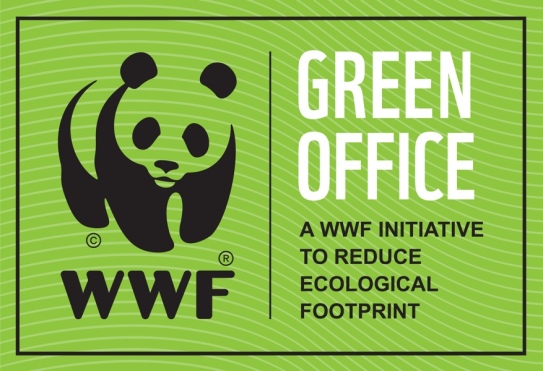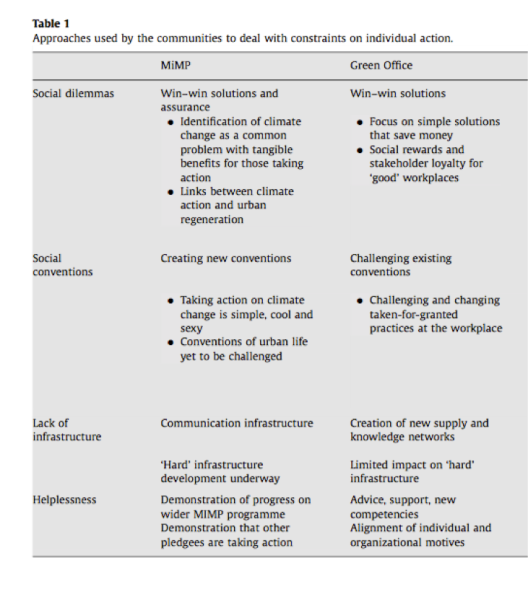Climate change mitigation and adaptation schemes fundamentally rely on behavioral change, both at the individual and the collective level. Thus, collaborative sustainability initiatives intersect with, and are in informed by, the field of behavioral psychology. This blog post aims to examine the behavioral psychological science surrounding the concept of open source, specifically as it relates to climate change mitigation. I argue that open source design, which relies on collaborative innovation, is supported by psychological evidence on behavioral change and motivation. On the other hand, the intellectual property system wrongly places the burden of responsibility on individuals to create change in the sustainability arena: “exhortations to individuals to ‘take responsibility’” are both frustrating and induce feelings of disempowerment and helplessness, chief obstacles to energy-related behavioral change (Thøgersen, 2005).
There is a myriad of research revealing how climate change mitigation schemes that target individuals decrease their intrinsic motivation and lead to feelings of helplessness and fatigue, which ultimately translates to inaction. In Eva Heiskanen, Mikael Johnson, and Simon Robinson’s article, “Low-carbon communities as a context for individual behavior change,” the researchers provide an abundance of psychological literature arguing that “more focus should be placed on the community level,” and that “energy users should be engaged in the role of citizens, and not only that of individual consumers.” Targeting individuals has been a historically ineffective method of changing energy-related behaviors. While some individualized energy programs have been successful (Geller et al., 2006), a much greater number have faltered, which has led to increased skepticism about the effectiveness of privatized approaches in regards to changing consumptive life-style patterns.
Sustainability efforts that target individuals to innovate and “save the world” incorrectly presume that consumers have full control over their behaviors and make decisions in isolation (Lutzenhiser, 1993; Wilhite et al., 2000; Jackson, 2004). In reality, psychological behavioral science emphasizes the “socially grounded nature of human behavior.” Unless citizens can assure themselves that others are also collaborating to combat climate change, their efforts to reduce their carbon footprint may appear pointless (Kollock, 1998). The intellectual property law system disregards the inherently social nature of human behavior (Wilhite et al., 2000). In other words, an individuals’ decision to “make a difference” ultimately has more to do with “social conventions” than with their own personal beliefs and rationale. Despite that individuals may temporarily be induced by information or eco-labeling incentives to “challenge the status quo” and to change their behaviors, these changes are often short-term and “rarely survive once the change interventions are discontinue” (Kurz, 2002; Abrahamse et al., 2005). Hence, for lasting change, psychological researchers conclude that an “individual needs to be supported by new routines, infrastructures, institutions and networks,” which aligns with the fundamental design of open source (Bijker et al., 1986; Rohracher, 2001).
Maniates, Heiskanen, and Banerjee’s research on climate change mitigation schemes that appeal to individual responsibilities reveal a converging finding: if sustainability efforts are to be even remotely successful, they should work within a community-based and socially-engaging context, such as open source projects. The research team provides a case study on Green Office –a workspace training program run by WWF Finland, which employs community-building practices to promote low-carbon workplaces. WWF Finland witnessed significant energy reductions, and the researchers ultimately conclude that, in order to effectively combat climate change, both social and structural mobilization is required.


Banerjee, Abhijit and Barry D. Solomon. “Eco-labeling for energy efficiency and sustainability: a meta-evaluation of US programs, Energy Policy.” DeepDyve. Elsevier, 01 Jan. 2003. Web. 10 May 2017.
Heiskanen, Eva, Mikael Johnson, Simon Robinson, Edina Vadovics, and Mika Saastamoinen. “Low-carbon communities as a context for individual behavioral change.” N.p., n.d. Web. 10 May 2017.
Tiefenbeck, Verena , Thorsten Staake, and Kurt Roth. “For better or for worse? Empirical evidence of moral licensing in a behavioral energy conservation campaign.” For better or for worse? Empirical evidence of moral licensing in a behavioral energy conservation campaign. N.p., n.d. Web. 28 Mar. 2017.
https://wwf.fi/en/green-office/
